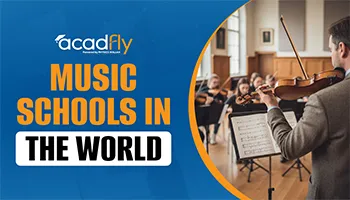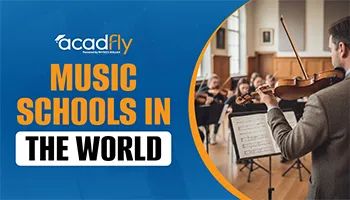


Music Schools In the World: Music education is evolving across the world, with many institutions offering training in classical, contemporary, and modern styles. Several countries have globally recognised academies focused on performance, composition, sound engineering, and music research. The sections below give an overview of leading music schools, including international institutions, classical music academies, and well-known music schools in India.
10 Best Music Schools in the World
Best music schools in the world are known for strong performance training, global faculty, and advanced music technology programmes. Students often explore classical, contemporary, and modern styles. The list of music schools in the world includes institutions that consistently shape leading performers, composers, and producers through world-class learning environments
|
10 Best Music Schools in the World |
|||
|
School Name |
Location |
QS World Ranking by Subject: Music (2025) |
Major USP (Unique Selling Point) |
|
Royal College of Music |
London, UK |
1 |
One of the most intensive programs of public performance in the world; amazing location opposite the Royal Albert Hall. |
|
Royal Academy of Music |
London, UK |
2 |
Focus on Artistic Excellence, bringing together world-renowned artists and the finest students; over £5M awarded annually in scholarships. |
|
Guildhall School of Music and Drama |
London, UK |
3 |
Offers professional training in Music, Drama, and Production Arts; creatively allied with the Barbican Centre and the London Symphony Orchestra. |
|
Conservatoire national supérieur de musique et de danse de Paris (CNSMDP) |
Paris, France |
4 |
An old institution (est. 1795) with a focus on both tradition and innovation, offers specialized training in music, dance, and sound technologies. |
|
Royal Northern College of Music (RNCM) |
Manchester, UK |
5 |
Known for its flexibility to build a bespoke program, including a unique 4-year BMus (Hons) in Popular Music. |
|
The Juilliard School |
New York City, USA |
6 |
A world leader in performing arts education (Music, Dance, Drama); located at Lincoln Center; emphasizes artistic excellence and interdisciplinary collaboration. |
|
The Royal Danish Academy of Music (RDAM) |
Copenhagen, Denmark |
7 |
The oldest and largest professional institution of musical education in Denmark; housed in the former headquarters of the Danish national radio (Radiohuset). |
|
Curtis Institute of Music |
Philadelphia, USA |
8 |
Highly selective with an incredibly small student body (150-175) and a strict tuition-free policy for all admitted students. |
|
Sibelius Academy, University of the Arts Helsinki |
Helsinki, Finland |
9 |
The only music university in Finland; committed to fostering Finland's musical culture; offers specializations like Folk Music and Church Music. |
|
Moscow State Conservatory P.I. Tchaikovsky |
Moscow, Russia |
10 |
One of the oldest and most prestigious conservatories in Russia (co-founded in 1866); Tchaikovsky was an early professor; boasts famous alumni like Rachmaninoff. |
Best Music Schools in India
Best music schools in India provide structured training in classical, western, and contemporary music. These institutes focus on practical learning, experienced mentors, and performance exposure. Many feature among global rankings alongside the best classical music schools in the world, offering students a strong foundation in theory, rhythm, and creative development.
|
Best Music Schools in India |
|||
|
School Name |
Location |
Primary Specialization |
Key Highlights |
|
KM Music Conservatory (KMMC) |
Chennai |
Western Classical & Music Technology |
Founded by A.R. Rahman; offers degrees accredited by Middlesex University, UK; strong focus on Western theory, performance (especially piano), and audio engineering. |
|
Calcutta School of Music |
Kolkata |
Western & Contemporary Classical |
Established in 1915, one of India's oldest institutions; offers training in piano, violin, voice, and theory; also offers jazz and Indian music. |
|
Madras Music Academy |
Chennai |
Carnatic Classical |
Established in 1928; primary institution for the promotion and safeguarding of Carnatic music; famous for its annual music festival and prestigious Sangita Kalanidhi award. |
|
Prayag Sangeet Samiti |
Prayagraj (Allahabad) |
Hindustani Classical |
Established in 1926; premier institution for Hindustani classical music education and degree programs. |
|
Bhatkhande Sanskriti Vishwavidyalaya |
Lucknow |
Hindustani Classical |
Founded in 1926; one of the oldest universities dedicated solely to music and arts; structured to make music education accessible to all. |
|
Shankar Mahadevan Academy |
Online (HQ in Bangalore) |
Indian Classical (Hindustani & Carnatic) |
Founded by Shankar Mahadevan; primarily an online academy with a structured, milestone-based curriculum for global access to Indian classical music. |
|
Global Music Institute (GMI) |
Greater Noida |
Contemporary & Western Music |
Focuses on contemporary music performance and production (Jazz, Rock, Pop); collaborates with international faculty and has ties with Berklee Global. |
|
The True School of Music |
Mumbai |
Contemporary Music & Production |
Offers training in music performance, production, and audio engineering, serving the heart of India's commercial music industry (Bollywood and Pop). |
Career Scope in the Music Industry
1. Music Performance: Aspirants can build a career as vocalists, instrumentalists, or stage performers in classical, contemporary, or world music genres. Live concerts, studio recordings, and collaborations across global platforms create steady opportunities for talented performers.
2. Music Production and Sound Engineering: The field offers roles in audio mixing, sound design, studio recording, background scoring, and digital production. With the rise of OTT, gaming, advertising, and independent music labels, skilled producers and engineers stay in high demand worldwide.
3. Teaching and Academic Roles: Professionals can work in music schools, universities, and private training institutes. Many opt for independent teaching, online classes, or mentorship programs. This path suits individuals who enjoy sharing musical knowledge and helping students build artistic skills.
4. Music Composition and Songwriting: Composers and lyricists contribute to films, television, advertisements, gaming, and independent albums. Creativity, rhythm sense, and understanding of genres help in building a strong portfolio. Global streaming platforms also allow composers to reach wider audiences.
5. Music Therapy: Music therapy blends art and science to support emotional, mental, and physical well-being. Hospitals, rehabilitation centres, schools, and wellness programs hire trained therapists. The demand is rising due to increased awareness of holistic health and emotional support.
6. Media, Broadcasting and Entertainment: Music professionals find work in radio, television, digital media, and live event management. Roles include music programming, curation, A&R, talent scouting, and coordination for concerts or festivals. The expanding entertainment sector strengthens job possibilities.
